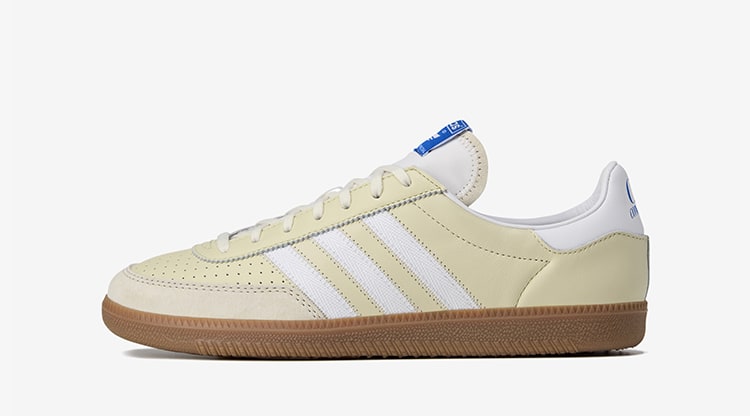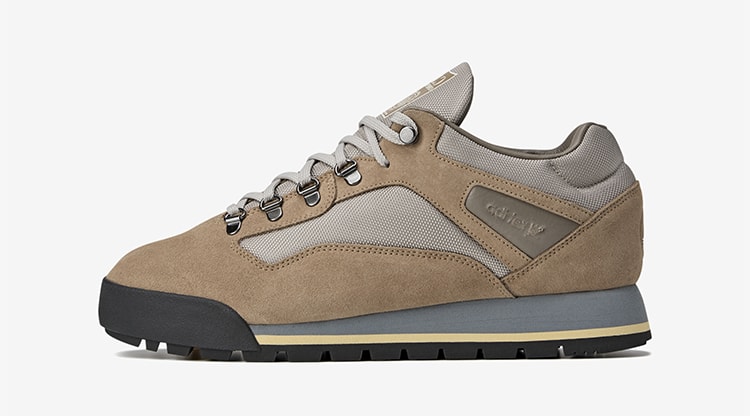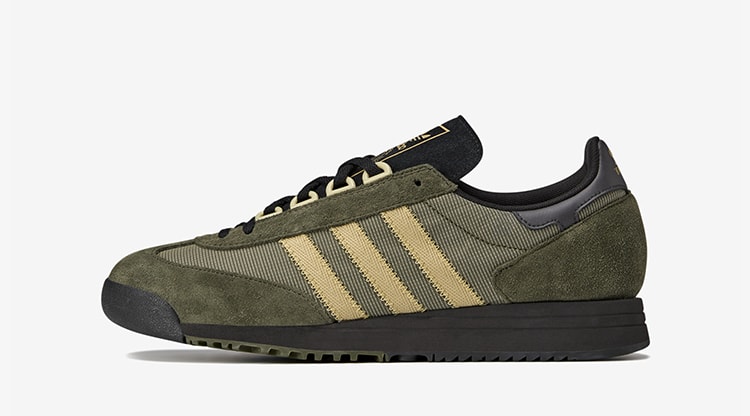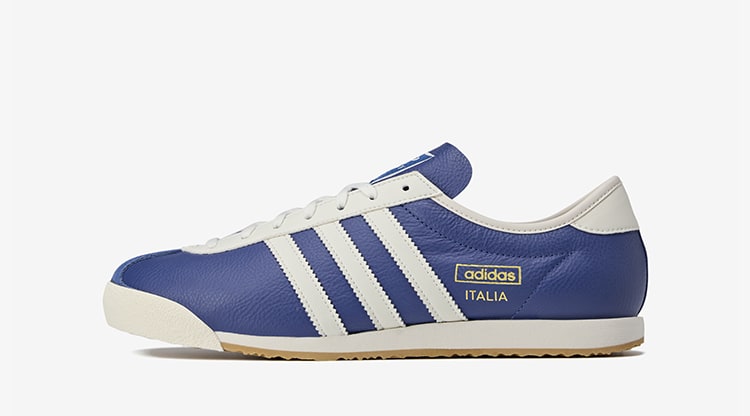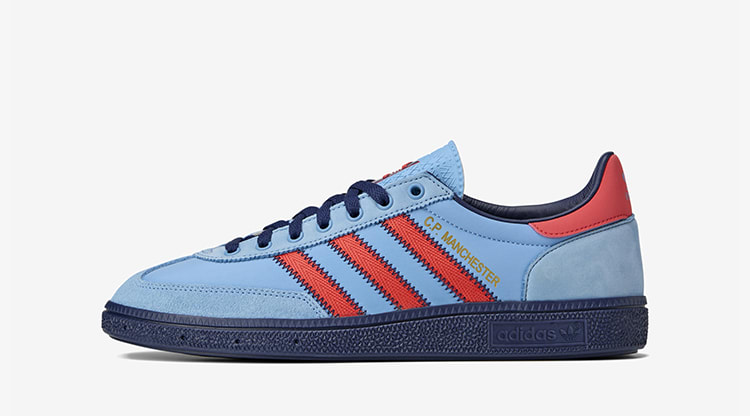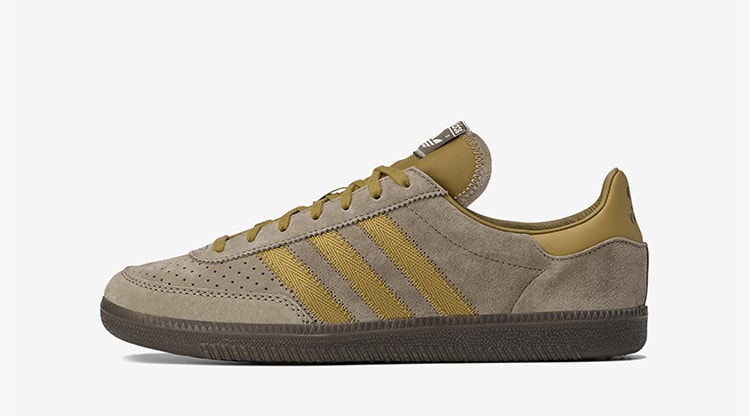Adidas x C.P. Company Wimberly Sneaker
Off White, White & BrownAdidas x C.P. Company SPZL Helvellyn Sneaker
Cardboard, Brown & GreyAdidas x C.P. Company SPZL SL83 Sneaker
Dust Cargo, Sand & Night CargoAdidas x C.P. Company SPZL Italia Sneaker
Collegiate Royal, White & GumAdidas x C.P. Company SPZL Manchester Sneaker
Light Blue & Bright RedAdidas x C.P. Company SPZL Wimberly Sneaker
Tech Khaki, Bronze & Off WhiteInterviews
WEAVING NARRATIVES WITH MJK
Collaborations
UrlfreezeShops X TIMBERLAND “DOWN FILLED”
Culture
WHAT HAPPENED @ ADIDAS ADIZERO: 'The Pursuit of Fast' Manchester
Culture
UrlfreezeShops, ADIDAS SPZL & C.P. COMPANY: The Art of Filmmaking @ Triennale di Milano
Editorial
ADIDAS SPZL X C.P. COMPANY
Editorial
UrlfreezeShops CURATES: FORM & FUNCTION
WEAVING NARRATIVES WITH MJK
11 November 2024Ahead of the upcoming Air Jordan 4 Retro ‘Fear’ launch, UrlfreezeShops caught up with DJ & Producer MJK to dive into his world of rhythm and sound.
Watching MJK mix is akin to being caught in a whirlwind of rhythms, subterranean basses and dubbed out pads. Deftly jumping between three decks, constantly juggling tracks and effortlessly weaving narratives of UK music history into pulsing 140-plus BPM techno thumpers, the up-and-coming producer and DJ has been quietly building a name for himself as one of the UK’s rising stars.
Tapping into his encyclopaedic knowledge of Dubstep, Grime and UK Garage, the Newham-born, but London-based, MJK – real name Michael Kedjanyi – has channelled his adolescent obsession for dance music into his shapeshifting music behind the decks and the DAW. Brought up around the sounds of UKG, this familial passion fed into his deep appreciation for UK dance music, leading him to the darker sounds of OG Dubstep and onto the harder lyricism of Grime. Pairing these distinctly British genres with forward-thinking techno, MJK has achieved renowned for his virtuoso mixing. Seemingly effortless, Kedjanyi interlocks grooves like few others, merging the syncopated rhythms of Dubstep with Techno’s more rigid core to great effect, cultivating a kinetic and propulsive approach that champions a diverse array of music and celebrates a creative style of DJing.
With a slew of performances at acclaimed clubs such as The White Hotel, RSO.Berlin, Fabric, Corsica Studios and many more, the master-blender has made waves with the collaborative Patchworks Vol. 1 EP with Ilian Tapes’ Skee Mask. Now with a residency at London’s legendary radio station Rinse.FM and space at Sherelle’s BEAUTIFUL + AIAIAI music production studio – a free to use space dedicated to Black and/or queer artists – MJK is an unstoppable force in UK dance music. Spending time with Kedjanyi at his studio before his Rinse.FM residency, we discussed all things dance music, his approach to mixing and production, and how being explorative can lead to unexpected results ahead of the launch of the Air Jordan 4 Retro 'Fear'.
What first led you to DJing initially? Did you have a musical background prior to learning to DJ?
I’ve actually got no musical background; my parents aren’t musicians. The reason I got into DJing was that my mum and dad were really into Garage, so when I was growing up, I was listening to all these Garage tunes on the radio in the car. As I got a bit older, I started to wonder what the tunes were as I couldn’t remember the names at the time. I then found Daniel Bedingfield, Sunship, Artful Dodger, Craig David. That was the first time I was into electronic music, really, because I was always into metal and alternative music – as I still am now. I then tried Virtual DJ, as every teenager does, and got to the point where I started learning that. I wasn’t good at it, but I kept at it. It was something to spend time doing as a kid, and didn’t really think that much of it. Eventually I got Traktor and my mum bought me the Traktor S2, which is a little controller, and it was at that point when I was maybe 13 or 14 that I really started learning more and getting into Grime, Dubstep and Techno. My love for Dubstep and the darker side of dance music was after I started to learn about UKG and the offshoots of that genre. From what I can remember, I would find out about all of these different kinds of music and diving deeper into the music. It was always very insular. I always say that I’m more of a collector than I am a DJ or a producer, I just happened to end up being a DJ and a producer. All of my love for it comes from collecting music.
How did you then find these other genres after being introduced to Garage by your parents?
Where I grew up, in southwest England, no one was into Dubstep. It wasn’t cool. It’s come back round nowadays, and I love that. I was showing my friends Dubstep on the bus on the way home and no one gave a shit. It’s a bit different now – everyone is into electronic music in one way or another – it’s ubiquitous. When I was getting into it, I would never hear it on the radio. Y2K style and Jungle has all become cool now. When I was into it I didn’t have that, but I just loved the music. It was an obsession, very insular. It wasn’t passed around between my friends, I was just into this weird stuff. When you like something and there is an infinite world of it out there, you just keep going and stumble across more of it. I then found Grime. That was the golden era of SoundCloud, because all of the people I spoke to about it and would trade tunes with, I never met then until very recently. I was looking at these niche YouTube channels with all these dubplates on. You’d connect with people who would repost your tunes, and then they might ask you to do a guest mix and find out new tunes from them. Without that era, I don’t think that I’d be where I am now, because it was such an insular part of my life. I was mixing Chestplate Recordings, Deep Medi, you know, like dungeon dubstep, just to myself in my room. There was no Instagram, and no one gave a shit. It was purely just nerdy shit. For me, that was what it was. It was a really personal way of getting into it. I think if I’d have grown up in an earlier era where there were raves all the time, and everyone was a DJ, it may have been different. You could go to the record shops and that was where everyone would hang out, go to after school clubs where the kids were making Garage and Grime beats. I grew up at a time where there wasn’t much of that, at least where I was living. Maybe when I was 17 or 18 and was finally being let into clubs, I started to meet people and finally did have people to speak to about this music with in person. It’s a different experience now. For me, I got into it because I loved it, and that was it. That’s what made it great in a way. That feeling of discovery, of finally finding a tune that you love and having that all to yourself. The journey of musical exploration is so one sided, but that’s what makes it beautiful to me. Especially now that I can count back on all of that. I’m blessed enough to have a Rinse.FM show twice a month and I can go around the world playing music that I used to listen to as a child on great soundsystems in great clubs. It almost makes it worth being so solely into it for so long.
Your musical approach is multifaceted, with your influences coming from an expansive array of genres – from UKG, Dubstep and Grime to Breakbeat and Techno. What originally instilled this explorative streak in you in regard to music?
I’d always been into Techno, but I never played it out or got asked to play it. I remember doing a show with Pariah, and the first tune that I’d heard from him was over a decade ago. After I played the show and went home, I reflected on it thinking “holy fuck, that’s Pariah”. I was thinking when did that tune come out, it was the remix of Lucy that he did 11 years ago. It was strange to think that I’ve known this guy’s music for that long and suddenly I’m in the same room as him and playing with him. Back in the day we had loads of great record stores and online stores, like Surus, I got into the really dark side of techno. Osiris Music and artists like Killawatt, Ipman, Kryptic Minds. I remember seeing Icicle’s Boiler Room and he started off with Techno, and that’s how I got into Blawan, Clouds and Randomer. That’s how I originally got into it. I’d play little bits in my room, but I never got booked for it. I was originally getting booked for UKG. I remember at this one club night in Torquay, I ended up playing a bit more Grime and UK Funky and got a great reaction. I started making tunes off the back of that, and they were mostly Grime edits because the bar for getting into making music with Grime wasn’t too high. You can find a tune that you really like, and you can make your own refix of it, and then suddenly you’ve got a whole new thing. That’s how I got started. All of this stuff that I’m doing stems from refixing tunes. I only knew rhythm; I didn’t know anything about keys. Everything I make is very generative, I sit and sift through all of the sounds I sampled or sourced and generate a lot of interesting sounds and changes through processing these sounds. I was never very traditionally musical. Grime definitely got me to a place where I was able to at least create my own sound. I still play loads of Grime. I found that when I was at a Grime rave or playing one, there wasn’t so much room for exploration. When lock down happened, that’s when I started working with Skee Mask, and he showed me all of this beautiful Techno that had so many parallels to Grime. Even to this day, so many of the sounds that come out of Techno are so similar to stuff that comes from Grime. A lot of people hated lockdown, but it was quite a positive time for me. After I started playing again after lockdown, I didn’t have this purist mindset anymore. I was like “I’m going to play this tune with Mala’s Changes because I’ve not been able to hear it in a club for like 3 years.” And then I was thinking “why can’t I mix this into a Techno tune I really like?” Everyone was just ready for it after lockdown. It was a beautiful time because I really just started playing whatever the fuck I wanted to. The first time I really tried the Grime/Techno thing, which a lot of people are talking about now, was when I did a show with Logos on NOODS Radio. That was the first time I really gave it a go. There was a great recording we did on Sneaker Social Club that unfortunately got lost, but that was the first time I really felt like I nailed it. And that’s history. It kind of became an approach that I really loved doing. Following that I started making tunes with Skee Mask, Impey, Bluetoof. Oblig was a big inspiration too. He really got me out of my funk when I was struggling with making music. I came back to London and starting working at UrlfreezeShops, I didn’t tell anyone I was back and there wasn’t a big musical thing. I was trying to stay under the radar, but he grabbed me and got me to go on the radio and I started doing more and more. Playing music became interesting to me again at that point. The rest is history after that. Nowadays, I’m getting asked to speak about it more, but it is insane that I was at a point where I didn’t want to do it anymore, but through the love of the music I always get roped back into it. I’m very blessed to be able to do what I do.
Two genres that have been present in your sets throughout your tenure as a DJ are Grime and Techno. Traditionally these genres haven’t been particularly linked, but they seem to be becoming more entwined in modern dance music circles. Why do you think these two genres particularly complement one another despite seeming quite disparate?
Grime had a massive era with Rabit, Logos, Boxed, Mumdance and Visionist; they were so forward thinking with the way they would make music. Give credit to Skream, I just watched the documentary, and even Ricardo Villalobos was playing Midnight Request Line. It has been done, and I’m certainly not the first person to do it, but what really appealed to me about it was that my favourite track at that time when I started doing it was Bongo Dub by General Courts and Skee showed me this Slovakian Techno tune called Bedtime Story by DJ HU (Hardcore Underground). The drum patterns on these two tracks are exactly the same, and a lot of that track was bashment influenced. A lot of tribal techno has the same bashment drum pattern, albeit very fast. I realised that you could play those tracks together and the drums don’t clash, and you can get this really nice groove. A lot of the Grime stuff really complemented it well. So much of older Techno is so raw as well that it all really works together. Give credit to the Zenker brothers too, with their Ilian Tape label. I love that when Techno is not four to the floor, you can really get into rhythm. A lot of the old Dubstep and Grime tracks are so rhythm based, it’s not about massive sound, it’s about intricate grooves. They aren’t too dissimilar in that respect at all. I don’t really have this thought process in my head, unless I get asked. So, it’s nice to be asked because I get to rationalise it for the first time. It’s a great feeling being able to understand why I like certain things. Now I’ve done it, it seems so obvious. Even though you did have releases like Take Time by Novelist and Mumdance, Sniper Wolf, Cold Mission by Logos, at that point people weren’t that interested in hearing someone MC over a Techno beat, it was Grime MCs over Grime beats. If you went to a club and started playing “unse unse music”, which is what people would call it, you wouldn’t have people in the dance. Now it’s getting to the point where I’m playing to everyone and my love of music as a whole translates into the club, which is a very nice position to be in.
"Collaboration is such a good thing to do as a producer because it lets you realise your own shortcomings and in time you can find creative ways to make up for it."
Recently you have collaborated with Ilian Tapes’ Skee Mask and Impey – what does collaboration bring to your practice as a producer?
I’m don’t classify myself as a learned producer, so I do a lot of learning when I’m working with someone else. Working with Skee, I don’t think I’d have used LFOs and envelopes in the same way as I do now if we hadn’t made the Patchworks EP together. Impey taught me so much about processing, cos he’s a real music guy. He’ll have WhatsApp conversations with guys from Brazil and he’ll show then crazy Baile Funk stuff. He taught me that being a music lover means so much, as you can draw influences from everywhere. Bluetoof has amazing sound design and grooves, really functional stuff. Every one of them has taught me something completely different. I still learn things by myself but I love collaborating with people in person, I can’t do it by sending stems back and forth. I have to treat it as a live jam, which is how I do everything now. I sit and play with Ableton as a toy. Skee, for example, is a genius at production. I know I’m not a genius, I know I can’t do what he does. So, there’s no point in me trying to, I’ve got to do things my own way. Most of the time I’ll sit and jam, groove out. Often, I come out with something I like, sometimes I don’t as well, and that’s the process. I always go into every session and see what happens. I have my process, and it works for me. I’m not some production whiz kid though. Collaboration is such a good thing to do as a producer because it lets you realise your own shortcomings and in time you can find creative ways to make up for it, leading to you producing things you may have never thought you’d be able to produce. Unless someone shows you the difference, you aren’t ever going to do it.
Renowned for your 3-deck approach to mixing, what is it about this style of DJing that excites you?
I can expand on a theme way easier with three decks, especially when I’m jumping around genres. If I have this Dubstep tune then a great Techno tune that work really well together, if I have only two decks, I’d have to bring it back to where it’s either one or the other. If I have a Cluekid tune and an Oliver Ho tune locked in, that’s still an amalgamation of the two, so then you can expand on that. It’s allowed me to get to the point where I can ebb and flow between genres as it’s never just one thing, I can always have two things going at the same time. That’s how I’ve learnt to do it. Up until a short time ago, though, I wasn’t using three decks. The first time I did it was in Berlin on the radio. The set went really well, and they had four decks there. So, I just kept the blend in and tried it out and it worked. Following that I got the itch and the buzz for it, so I thought that if I could do it properly my mind would be open. It gives me freedom to take the sound where I want it to go. Sometimes I do play a really purist set, or if I’m going B2B. There’s very much merit to playing with two decks of course, and even just playing with one. What I’ve realised is that the way I like to communicate music is through three, or maybe more, decks.
"One time I played a full hour of Dub Techno, echoed it out at the end and played Omar’s Coming by Westside Gunn. You don’t get to do that in the rave!"
How did you get involved with the BEAUTIFUL + AIAIAI Studio?
The BEAUTIFUL Studio is run by Sherelle, and it’s a space exclusively for Black and/or queer people. It was actually my manager who showed me it. I’d never heard of it before, or only maybe loosely. So, I thought I’d shoot my shot and apply. Everything before that point, I was always at the mercy of someone else, going to their studio, or jumping in for a for quick session. I still do that now, but it’s amazing to have a space with like-minded people who all really care for the studio. It’s really important for people who look like me and act like me to have a space just to create, that’s completely free to use as well. Every day I’m thankful that I get to use it. At this point in time, it wouldn’t be feasible to have my own studio. Everything I’d previously made was made in my kitchen. Having this space that is properly treated for sound is so helpful in developing my work. I feel like when I go there I am actually working, I have a different mindset completely. Not to talk badly on people who do produce at home; some of the best music I’ve ever heard has been made in bedrooms. For me, it’s really helped, I can’t thank them enough!
You’ve been a resident at the legendary London radio station Rinse.FM for a while now. There is a different energy to doing a set on a radio station to performing within a club context – does your approach change when performing on Rinse?
The fact that you don’t have a crowd watching you means that you have the opportunity to really go experimental with the set. A couple of shows ago, I was going to do Garage, but my USB didn’t work so I ended up doing Dub Techno. Then I got the itch to switch it up and moved to House, then on to a super raw Grime set. Sometimes I’ll just go into Rinse and do a three deck, 120 BPM Dub Techno and slow dubstep set. It gives you the license to push your sound and try out new things when you’re on the radio. I can have guests on too – the first person I had on my show was Zed Bias. I can’t think of the amount of times that I’ve come into Rinse and my mind’s been blown by what I’ve heard. Live, I definitely do what I want, but I’m always conscious that I’m there to supply a groove and a feeling. I am always considering the crowd and playing what I think will feel really good in that moment. Radio is very much for me. I play what I want to hear because I think it’s sick. There’s been so many times where I’ve been playing at a club, and I’ve been thinking about loads of tunes that I love and could play, but I’m not going to stop what I’m doing and play them right now. Whereas on the radio you have that liberty of being able to wheel something up, echo it out and play a dub rockers tune if I really wanted to. One time I played a full hour of Dub Techno, echoed it out at the end and played Omar’s Coming by Westside Gunn. You don’t get to do that in the rave! It’s those parts that I really love.
Release information
AIR JORDAN 4 RETRO SNEAKER
Anthracite, Black & Pure Platinum
FQ8138-002
11/16/2024
Release information
AIR JORDAN 4 RETRO PS
White, Black & Pure Platinum
FV4537-002
11/16/2024
Release information
AIR JORDAN 4 RETRO TD
White, Black & Platinum
FV4538-002
11/16/2024
